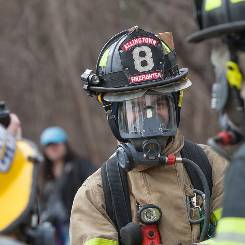

Fire protection engineering is a multidisciplinary program that combines principles from various areas of science and engineering. Our program teaches you how to apply these principles to the problem of fire protection by designing, constructing, and installing fire protection systems to prevent or minimize potential losses.
You’ll begin by laying a firm foundation in mathematics, science, and engineering, then move on to applying your knowledge through practical, hands-on laboratory experiences. As you progress through the program, you’ll also acquire the critical thinking and problem-solving skills that are vital in this field.
Our faculty are leaders and innovators in their fields, bringing both deep professional experience and academic rigor to the classroom.
The information below is designed to show the many possible careers you could pursue with your major. The research is provided by Encoura, the leading research and advisory firm focused exclusively on higher education. It includes median national salaries and industry growth projections over the next decade. Click here to view the full report.
Fire Protection Engineer
7% Growth 2017-2027
Deputy Chief of Fire Safety
7% Growth 2017-2027
Fire Inspector
8% Growth 2017-2027
An expansive study of thermal and fluid principles and applications including laws of thermodynamics, basic power cycles, conservation laws, internal and external flows, and convective heat transfer.
This course provides the components of building construction related to firefighter and life safety. The elements of construction and design of structures are shown to be key factors when inspecting buildings, preplanning fire operations, and operating at emergencies. The program will also show those who may design buildings the concerns related to both fire occurrence and the fire service safety.
The study of current fire and life safety codes as they relate to the prevention and control of structural fires.
The application of systems analysis, probability, engineering economy, and risk management techniques to the fire problem. The basic principles of fire growth and spread in a building. Time lines will be established from the time of ignition to that of extinguishment. Various methods of modifying the time line.
The University of New Haven offers a wide variety of in-depth courses that create a transformational educational experience for our students. To view the complete list of courses you'll take while pursuing a Bachelor of Science in Fire Protection Engineering, check out the Academic Catalog:
Get an inside look at what differentiates the University of New Haven and how your experiences as a student will prepare you for success.




All University of New Haven students have access to the many resources available through the University’s Career Development Center, which has been named one of the best in the nation by The Princeton Review.
From career assessments, networking, and job shadowing to on-campus interviews and salary negotiation, the Career Development Center provides the skills and connections to identify a meaningful career and an opportunity to pursue your passion.
Learn MoreWhether you're still in high school or are transferring from another college, we offer full- and part-time opportunities for undergraduates from inside the U.S. and abroad. The admission process can begin as early as the end of your high school junior year.
The Application Process
We offer a comprehensive financial aid program, with students receiving assistance in the form of grants, scholarships, student loans, and part-time employment. Funds are available from federal and state governments, private sponsors, and from university resources. More than 85 percent of the University's full-time undergraduate students receive some form of financial assistance.
Learn More